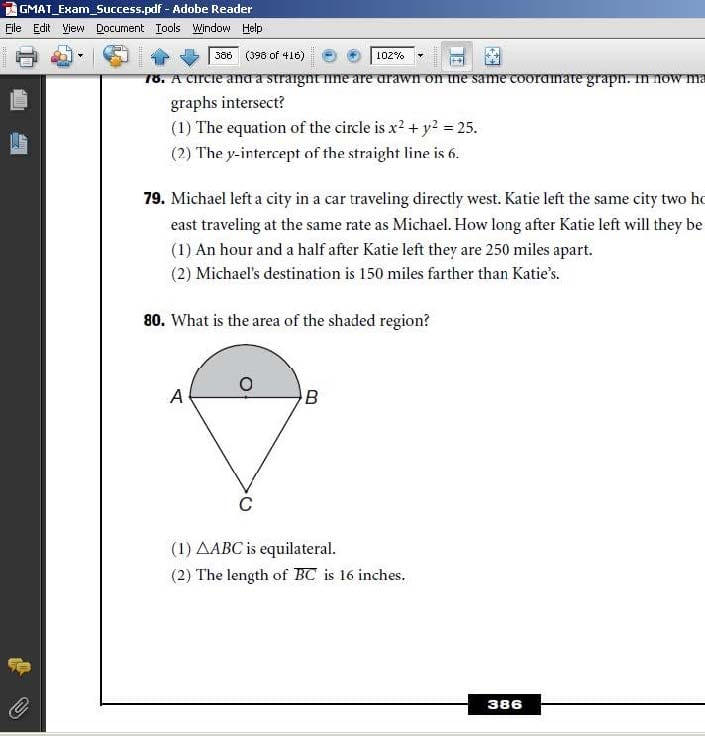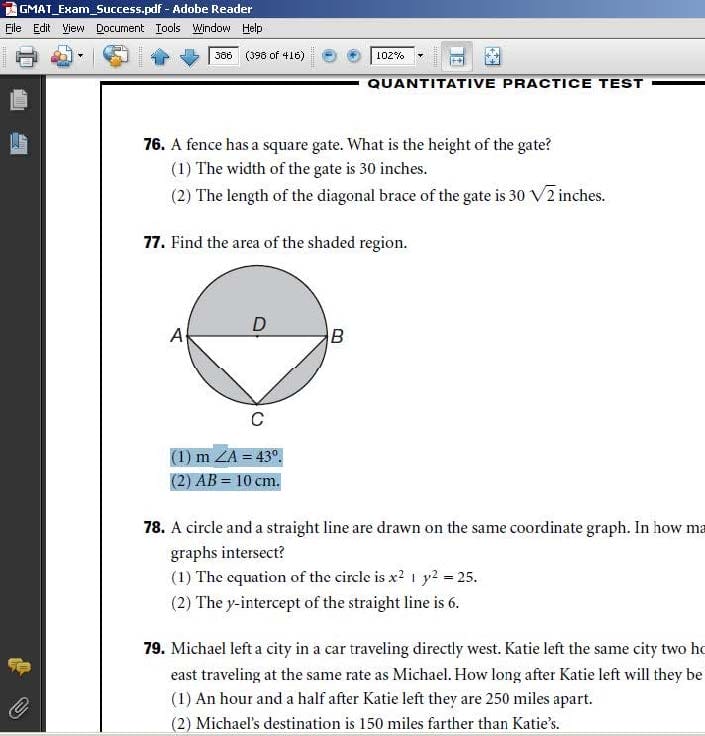Exam Details
Exam Code
:GMAT-QUANTITIVEExam Name
:GMAT - QuantitiveCertification
:Admission Tests CertificationsVendor
:Admission TestsTotal Questions
:738 Q&AsLast Updated
:Jul 01, 2025
Admission Tests Admission Tests Certifications GMAT-QUANTITIVE Questions & Answers
-
Question 231:
What is the sum of the two smallest integers in a set of different positive integers?
(1)
There are 4 integers in the set.
(2)
The average of the integers in the set is 3.
A.
Statement (1) BY ITSELF is sufficient to answer the question, but statement (2) by itself is not.
B.
Statement (2) BY ITSELF is sufficient to answer the question, but statement (1) by itself is not.
C.
Statements (1) and (2) TAKEN TOGETHER are sufficient to answer the question, even though NEITHER statement BY ITSELF is sufficient.
D.
Either statement BY ITSELF is sufficient to answer the question.
E.
Statements (1) and (2) TAKEN TOGETHER are NOT sufficient to answer the question, requiring more data pertaining to the problem.
-
Question 232:
What was the total amount John earned on his two investments?
(1)
John received an annual interest of 5% on one investment and 13% on the other.
(2)
John invested a total of $15,000 on both investments.
A.
Statement (1) BY ITSELF is sufficient to answer the question, but statement (2) by itself is not.
B.
Statement (2) BY ITSELF is sufficient to answer the question, but statement (1) by itself is not.
C.
Statements (1) and (2) TAKEN TOGETHER are sufficient to answer the question, even though NEITHER statement BY ITSELF is sufficient.
D.
Either statement BY ITSELF is sufficient to answer the question.
E.
Statements (1) and (2) TAKEN TOGETHER are NOT sufficient to answer the question, requiring more data pertaining to the problem.
-
Question 233:
What is the value of (a+b)?
(1)
a2-b2=133.
(2)
a-b=7.
A.
Statement (1) BY ITSELF is sufficient to answer the question, but statement (2) by itself is not.
B.
Statement (2) BY ITSELF is sufficient to answer the question, but statement (1) by itself is not.
C.
Statements (1) and (2) TAKEN TOGETHER are sufficient to answer the question, even though NEITHER statement BY ITSELF is sufficient.
D.
Either statement BY ITSELF is sufficient to answer the question.
E.
Statements (1) and (2) TAKEN TOGETHER are NOT sufficient to answer the question, requiring more data pertaining to the problem.
-
Question 234:
What is the value of X+Z?
(1)
X+Y=11
(2)
Z+Y=13
A.
Statement (1) BY ITSELF is sufficient to answer the question, but statement (2) by itself is not.
B.
Statement (2) BY ITSELF is sufficient to answer the question, but statement (1) by itself is not.
C.
Statements (1) and (2) TAKEN TOGETHER are sufficient to answer the question, even though NEITHER statement BY ITSELF is sufficient.
D.
Either statement BY ITSELF is sufficient to answer the question.
E.
Statements (1) and (2) TAKEN TOGETHER are NOT sufficient to answer the question, requiring more data pertaining to the problem.
-
Question 235:
Is the product XY divisible by 22?
(1)
X is divisible by 4.
(2)
Y is divisible by 11.
A.
Statement (1) BY ITSELF is sufficient to answer the question, but statement (2) by itself is not.
B.
Statement (2) BY ITSELF is sufficient to answer the question, but statement (1) by itself is not.
C.
Statements (1) and (2) TAKEN TOGETHER are sufficient to answer the question, even though NEITHER statement BY ITSELF is sufficient.
D.
Either statement BY ITSELF is sufficient to answer the question.
E.
Statements (1) and (2) TAKEN TOGETHER are NOT sufficient to answer the question, requiring more
data pertaining to the problem.
-
Question 236:
Is the integer X even?
(1)
X is divisible by 7.
(2)
X is divisible by 11.
A.
Statement (1) BY ITSELF is sufficient to answer the question, but statement (2) by itself is not.
B.
Statement (2) BY ITSELF is sufficient to answer the question, but statement (1) by itself is not.
C.
Statements (1) and (2) TAKEN TOGETHER are sufficient to answer the question, even though NEITHER statement BY ITSELF is sufficient.
D.
Either statement BY ITSELF is sufficient to answer the question.
E.
Statements (1) and (2) TAKEN TOGETHER are NOT sufficient to answer the question, requiring more data pertaining to the problem.
-
Question 237:
What is the area of the shaded region?

(1)
ABC is equilateral.
(2)
The length of

is 16 inches.
A. Statement (1), BY ITSELF, will suffice to solve the problem, but NOT statement (2) by itself.
B. Statement (2), BY ITSELF, will suffice to solve the problem, but NOT statement (1) by itself.
C. The problem can be solved using statement (1) and statement (2) TOGETHER, but not ONLY statement (1) or statement (2).
D. The problem can be solved using EITHER statement (1) only or statement (2) only.
E. The problem CANNOT be solved using statement (1) and statement (2) TOGETHER.
-
Question 238:
Michael left a city in a car traveling directly west. Katie left the same city two hours later going directly east traveling at the same rate as Michael. How long after Katie left will they be 350 miles apart?
(1)
An hour and a half after Katie left they are 250 miles apart.
(2)
Michael's destination is 150 miles farther than Katie's.
A.
Statement (1), BY ITSELF, will suffice to solve the problem, but NOT statement (2) by itself.
B.
Statement (2), BY ITSELF, will suffice to solve the problem, but NOT statement (1) by itself.
C.
The problem can be solved using statement (1) and statement (2) TOGETHER, but not ONLY statement (1) or statement (2).
D.
The problem can be solved using EITHER statement (1) only or statement (2) only.
E.
The problem CANNOT be solved using statement (1) and statement (2) TOGETHER.
-
Question 239:
A circle and a straight line are drawn on the same coordinate graph. In how many places do the two graphs intersect?
(1)
The equation of the circle is x2 + y2 = 25.
(2)
The y-intercept of the straight line is 6.
A.
Statement (1), BY ITSELF, will suffice to solve the problem, but NOT statement (2) by itself.
B.
Statement (2), BY ITSELF, will suffice to solve the problem, but NOT statement (1) by itself.
C.
The problem can be solved using statement (1) and statement (2) TOGETHER, but not ONLY statement (1) or statement (2).
D.
The problem can be solved using EITHER statement (1) only or statement (2) only.
E.
The problem CANNOT be solved using statement (1) and statement (2) TOGETHER.
-
Question 240:
Find the area of the shaded region.

(1)
m A = 43°.
(2)
AB = 10 cm.
A.
Statement (1), BY ITSELF, will suffice to solve the problem, but NOT statement (2) by itself.
B.
Statement (2), BY ITSELF, will suffice to solve the problem, but NOT statement (1) by itself.
C.
The problem can be solved using statement (1) and statement (2) TOGETHER, but not ONLY statement (1) or statement (2).
D.
The problem can be solved using EITHER statement (1) only or statement (2) only.
E.
The problem CANNOT be solved using statement (1) and statement (2) TOGETHER.
Related Exams:
Tips on How to Prepare for the Exams
Nowadays, the certification exams become more and more important and required by more and more enterprises when applying for a job. But how to prepare for the exam effectively? How to prepare for the exam in a short time with less efforts? How to get a ideal result and how to find the most reliable resources? Here on Vcedump.com, you will find all the answers. Vcedump.com provide not only Admission Tests exam questions, answers and explanations but also complete assistance on your exam preparation and certification application. If you are confused on your GMAT-QUANTITIVE exam preparations and Admission Tests certification application, do not hesitate to visit our Vcedump.com to find your solutions here.